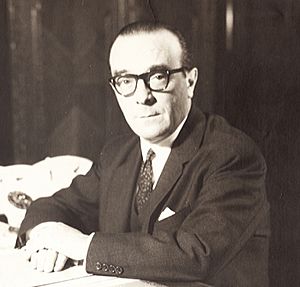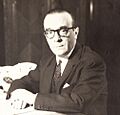José María Guido facts for kids
Quick facts for kids
José María Guido
|
|
|---|---|
 |
|
| President of Argentina | |
| In office 29 March 1962 – 12 October 1963 |
|
| Vice President | None |
| Preceded by | Arturo Frondizi |
| Succeeded by | Arturo Umberto Illia |
| Provisional President of the Senate | |
| In office 31 March 1958 – 29 March 1962 |
|
| Preceded by | Ramón Albariño |
| Succeeded by | Eduardo Gamond |
| National Senator | |
| In office 1 May 1958 – 29 March 1962 |
|
| Constituency | Río Negro |
| Personal details | |
| Born |
José María Guido Cibeira
29 August 1910 Buenos Aires, Argentina |
| Died | 13 June 1975 (aged 64) Buenos Aires, Argentina |
| Resting place | La Recoleta Cemetery, Buenos Aires, Argentina |
| Political party | Radical Civic Union |
| Spouse | Purificación Areal |
| Alma mater | National University of La Plata |
| Profession | Lawyer |
José María Guido (born August 29, 1910 – died June 13, 1975) was the President of Argentina from March 29, 1962, to October 12, 1963. He led a temporary civilian government after the Argentine military removed President Arturo Frondizi from power.
Guido's time as president, which lasted 19 months, was tough. Argentina faced a serious economic slowdown and conflicts between different groups within the military. There were also rules that stopped some political groups, like the Peronists, from taking part in politics. But with important help from the "legalist" part of the military, Guido succeeded in bringing Argentina back to a normal, constitutional government. This happened with a general election held on July 7, 1963.
Contents
Biography
Early Life and Education
José María Guido was born in Buenos Aires, Argentina, on August 20, 1910. He was one of two sons born to Italian immigrants. He grew up in the San Telmo area of the capital city. In 1940, he finished his law studies at the University of La Plata.
Starting a Career in Law and Politics
Before becoming a politician, Guido worked as a lawyer. He was a member of the Radical Civic Union (UCR), a traditional political party for Argentina's middle class. In 1946, he moved to Viedma, the capital of Río Negro, to join a law firm.
Guido began his public service career in 1951. He helped create a provincial agency called IDEVI, which worked on developing hydroelectric power in Río Negro. He even traveled to the U.S. to learn from a similar public utility there.
Within ten years, Guido became a well-known national political figure. When the UCR party split in 1956, he joined a new group called the Intransigent Radical Civic Union (UCRI). In 1958, he was elected to the Argentine Senate to represent Río Negro. While in the Senate, Guido was known for being a good negotiator. He worked with other senators to promote hydroelectric projects in his region.
A very important event for Guido was when his fellow senators chose him to be the Senate President. This made him next in line to become president if the current president and vice president were unable to serve. This became very important later on.
Presidency
How Guido Became President
Guido became president after the military removed President Arturo Frondizi from office on March 29, 1962. For more than 12 hours after the military takeover, Argentina had no president. Civilian leaders and military allies worked to prevent a military dictator from taking over. Since the Vice Presidency was empty, Guido was next in line according to Argentina's Constitution.
Guido was loyal to Frondizi and didn't want to become president. But leaders from his party, especially Frondizi's Defense Minister, urged him to take the job. They told him that Frondizi himself wanted Guido to become president. On the evening of March 29, 1962, Guido took an oath in front of the Supreme Court of Argentina. He swore on a copy of the Constitution, showing that he wanted to keep the country's legal process going.
Even though he was president, Guido was heavily influenced by the military. He had to "co-govern" with them, meaning they had a lot of power and could stop his decisions. The military itself was divided into two main groups: the Azules ("Blues") and the Colorados ("Reds"). The Azules wanted to follow the Constitution and return to civilian rule. The Colorados wanted a military dictator to take charge.
These two groups had intense fights in late 1962 and early 1963. These conflicts almost led to a civil war in Argentina. The Azules eventually won these battles. This allowed Guido to stay in office and helped pave the way for Argentina to return to a constitutional government. This happened through the July 1963 election, which brought Arturo Umberto Illia to power.
Economic Challenges and Policies
In the years before Guido's presidency, Argentina's economy had faced problems. There was high inflation, meaning prices were rising quickly. The country also had low foreign money reserves.
Under pressure from military and agricultural groups, Guido appointed Álvaro Alsogaray as Minister of the Economy. Alsogaray put in place strict economic policies. The value of Argentina's money (the peso) was lowered by 59%. The government also reduced the amount of money circulating and tightened credit. It also spent less money to balance the budget.
These policies led to a tough two-year economic slowdown. The country's total production (GDP) decreased in both 1962 and 1963. Even with strict policies, inflation remained high. Unemployment also reached 9% in July 1963, a very high level for the time. However, these policies did help increase Argentina's foreign money reserves.
One positive point was that exports grew. Argentina sold more goods to other countries, especially beef, and found new markets. The country also started exporting new types of goods, like sugar, fruit juices, and even manufactured items.
During Guido's time, Argentina continued to welcome foreign direct investment (money invested by foreign companies). This was a key part of the previous president's economic plan. U.S. companies, for example, had invested a lot of money in Argentina and created many jobs.
Foreign Relations
Under President Guido, Argentina became closer with the United States. Argentina took a strong stand against Cuba during the Cold War. In August 1962, Argentina stopped Cuba from joining a trade group. This was a big change from the previous president's policy.
When the Cuban Missile Crisis happened in October 1962, Guido was the first Latin American leader to offer military help to the U.S. Argentina sent two naval ships to help the U.S. block Cuba. The U.S. government was very grateful for Argentina's support.
Argentina also played an important role in President John F. Kennedy's "Alliance for Progress" program. This program aimed to help Latin American countries develop.
Political Rights and Freedoms
Under pressure from the Colorados military faction, Guido made some anti-democratic decisions in 1962. He tried to change a law to give himself more time to call for new elections. He also canceled the results of recent provincial and Congressional elections. He stated that he would not allow any Peronists to hold public office.
Later, Guido suspended Congress completely. He also created new laws for political parties and elections. These laws were designed to help conservative parties and limit the power of other groups.
However, the media in Argentina remained relatively free under Guido. Newspapers could still publish articles that criticized the government.
In June 1963, Guido banned a new political group that included Peronist candidates. On July 5, 1963, Perón, who was in exile, told his supporters to cast blank ballots in the election. Despite these restrictions and political unrest, the election on July 7, 1963, was peaceful and fair. About 85% of Argentines voted, showing their commitment to democracy.
The 1963 General Election
As the election got closer, there were worries that military officials might try to stop it. Army leaders kept troops in their barracks to prevent any attempts to take over. The military's "Azules" faction wanted the elections to happen.
At first, the Azules agreed to let Peronists participate in a limited way. However, last-minute decisions by the Minister of the Interior removed a seven-party group and threatened its presidential candidate. This candidate accused Guido of supporting "tyranny." But Argentina's courts allowed the candidate to run.
The Argentine Communist party was also banned in May 1963.
Guido publicly asked his countrymen to respect the elections and allow the country to return to a constitutional government. However, he did not agree to postpone the election. He also reluctantly allowed the arrest of 50 of his own party members.
The general election took place as planned on July 7, 1963. About 70,000 troops were sent out to keep order. As a safety measure, police arrested almost 400 civilian and labor union leaders before the election. Most of these prisoners were released soon after.
The "Azul" military leaders were happy with the election results, as they weakened both Perón and Frondizi's influence. However, instability did not end. After the election, a Peronist leader warned that Perón's followers might turn to illegal activities because they were still banned from politics. Guido also issued a decree banning 29 groups that were thought to be linked to Communist activities.
After His Presidency
After his term ended, Guido went back to Viedma to continue his law career. He later returned to public service, working for Hidronor S.A., a government-owned company that managed hydroelectric power. He became president of Hidronor in 1973 but resigned the next year.
Guido also helped create a center-right political party in Río Negro in 1972. This party remained important in the province's politics for many years.
José María Guido passed away on June 13, 1975, in Buenos Aires. He is buried in the city's Recoleta Cemetery.
Images for kids
See also
 In Spanish: José María Guido para niños
In Spanish: José María Guido para niños
 | Stephanie Wilson |
 | Charles Bolden |
 | Ronald McNair |
 | Frederick D. Gregory |


